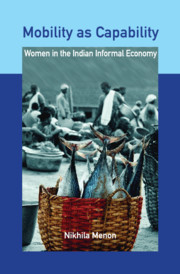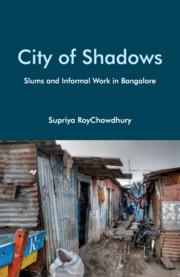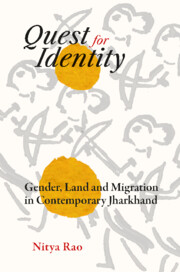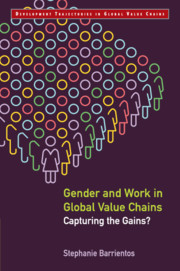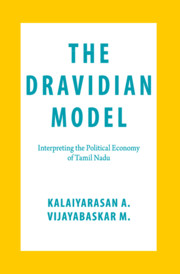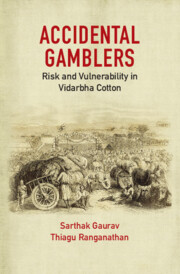Mobility as Capability
Women in the Indian Informal Economy
£75.00
- Author: Nikhila Menon
- Date Published: September 2021
- availability: In stock
- format: Hardback
- isbn: 9781108836425
£
75.00
Hardback
Other available formats:
eBook
Looking for an inspection copy?
This title is not currently available on inspection
-
This book highlights accounts of women workers to capture the domains of gendered mobility, which challenges the exalted status conferred on women in the Kerala model of development. It contests and deconstructs the development discourse which considers women's work mobility as an indicator of autonomy and agency using Capability Approach. The concept of 'transformational mobility' and its measurement introduced in the book advances the understanding of mobility, autonomy and agency and the intersectionality in the context of gender and work. Through an in-depth exploration of lived experiences of informal women workers the author illustrates how patriarchal structures are shaped and reinforced by work places, markets and the state. The central question is - can we steer development policies to facilitate collective capabilities for women where informal work arrangements are becoming the norm?
Read more- Provides insights on lived experiences of hard to reach community of informal women workers
- Challenges the myth of exalted status of women in the Kerala model of development
- In-depth analysis of the complex patriarchal structures of State, markets and work places which stifle women's agency
Reviews & endorsements
'Menon questions prevailing assumptions that women's mobility, their freedom and ability to move beyond their households into paid work, necessarily enhances their autonomy and empowerment. She draws on Sen's capability approach to theorize her innovative concept of 'transformational mobility' to assess whether women's work mobility is empowering. Her inter-disciplinary analysis is applied to a fascinating comparison of informal women working in seafood processing versus self-employed fish vendors in Kerala, India. Her findings demonstrate that paid work outside the household is not sufficient to enhance women's agency and autonomy. Transformational mobility is more likely under circumstances where women have greater collective agency and ability to bargain over their working conditions. Menon's book is essential reading for all researchers, practitioners and policy makers focusing on women's work in domestic and global production. It advances an insightful analysis of transformational mobility applicable to assessing a range of occupations. It provides a challenging contribution to current thinking on constraints and potential for women's social and economic empowerment.' Stephanie Barrientos, University of Manchester
See more reviews'Menon's book shatters the myths regarding the exalted status of women in Kerala by drawing attention to the deprivation, segregation in low skilled work, gender gaps in wages and poor working conditions suffered by women engaged in informal work in fisheries. Drawing attention to the constraints imposed on women by patriarchal social structures in Kerala, she questions the prevailing arguments that translate mobility into autonomy and agency. She compares this constrained state with what she calls 'Transformational mobility' or freedom in the real sense, a state of non-domination. The pathways to autonomy of women are fraught with several challenges which can be addressed with better understanding of the underlying gender norms, which this book attempts to unravel. The book is a must-read for anyone working in the field of development and gender.' Aasha Kapur Mehta, Institute for Human Development, New Delhi
'The work on Mobility as Capability reflects on a wide range of issues, enhancing our understanding of mobility, autonomy, and agency, and the intersectionality in the context of gender and work. Situating informal work by women in some of the dynamic activities in Kerala the volume envisages women's work mobility as an indicator of autonomy and agency in terms of capability approach. The work displays commendable originality and innovative thinking, which will stir our reasoning and encourage future research in this direction to help policy initiatives happen in an effective manner.' Arup Mitra, Institute of Economic Growth, New Delhi
Customer reviews
Not yet reviewed
Be the first to review
Review was not posted due to profanity
×Product details
- Date Published: September 2021
- format: Hardback
- isbn: 9781108836425
- length: 208 pages
- dimensions: 235 x 160 x 17 mm
- weight: 0.44kg
- availability: In stock
Table of Contents
List of Tables
List of Figures
1. Transformational Mobility as Capability
2. Reflections on Transformational Mobility, Autonomy and Women's Work
3. Women in 'Kerala Model': Myths and Realities
4. Situating Informal Work by Women in Fisheries in Kerala
5. 'Measuring Mobility' of Women: Unravelling the 'Explicit' and the 'Implicit'
6. Pathways to Transformational Mobility of Women Workers: A Qualitative Comparative Analysis
7. 'Subordinating Self': 'Maneuvering Patriarchy' among Women Workers
8. Self Categorisation, Group Identity and Agency among Women Fish Vendors
9. Transformational Mobility: From Individual to Collective Agency of Informal Women Workers
Bibliography
Index.
Sorry, this resource is locked
Please register or sign in to request access. If you are having problems accessing these resources please email [email protected]
Register Sign in» Proceed
You are now leaving the Cambridge University Press website. Your eBook purchase and download will be completed by our partner www.ebooks.com. Please see the permission section of the www.ebooks.com catalogue page for details of the print & copy limits on our eBooks.
Continue ×Are you sure you want to delete your account?
This cannot be undone.
Thank you for your feedback which will help us improve our service.
If you requested a response, we will make sure to get back to you shortly.
×
